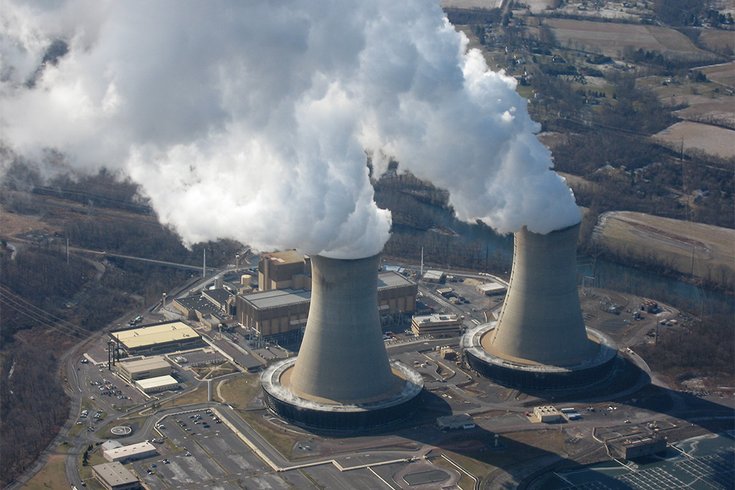
May 24, 2018
 Arturo Ramos – CC BY-SA 2.5/via wikipedia
Arturo Ramos – CC BY-SA 2.5/via wikipedia
The cooling towers at the Limerick Generating Station in Montgomery County are seen in this aerial photo. The nuclear power plant is about 28 miles northwest of Center City Philadelphia.
Decades ago, schools routinely held "duck and cover" drills aimed at preparing students to survive a thermonuclear attack. And the Civil Defense Administration produced films instructing Americans on how to respond during a nuclear event.
An entire generation has grown up without threat of nuclear war. Many millennials can hardly recall the dissolution of the Soviet Union, much less the fears of the Cold War.
Recent saber-rattling by North Korea – the country has been aggressively testing missiles that could conceivably carry nuclear weapons to the continental United States, though more recently there has been talk about possible "denuclearization" – has some places reviewing their safety protocols.
For some who live in the extended shadow of cooling towers, their nuclear concerns are more likely focused on preparation for a possible power plant emergency.
In March 1979, Unit 2 at Three Mile Island reactor, near Middletown, Pa., suffered a partial meltdown. It remains the most serious accident in U.S. commercial nuclear power plant operating history. The limited release of radioactivity had no detectable health effects on plant workers or the public, according to the Nuclear Regulatory Commission.
Closer to home, three power plants operate in the Philadelphia region: the Limerick Generating Station in Montgomery County, and the Salem and Hope Creek generating stations in Salem County.
The NRC defines two emergency planning zones around nuclear power plants:
• A plume exposure pathway zone with a radius of 10 miles, concerned primarily with exposure to and inhalation of airborne radioactive contamination, and
• An ingestion pathway zone of about 50 miles, concerned primarily with ingestion of food and liquid contaminated by radioactivity
According to the 2010 census, 252,197 people lived within 10 miles of Limerick, a number that has grown significantly in the past 10 years. More than 8 million people lived within 50 miles of the plant, which sits about 28 miles northwest of Center City Philadelphia.
While chances of a nuclear attack or a nuclear meltdown seem remote, officials say residents should be prepared nonetheless. Here's how to be ready and take action if either of those scenarios occur, experts say:
• In any nuclear or radiological event, take shelter immediately, heading to the lowest part of the building, preferably an underground area. Create as much space as possible from fallout particles.
• Prepare to shelter in place. Have an emergency kit filled with enough food and water to last at least three days, as well as a battery-operated radio and any power cords needed for electronic devices.
• The time required to shelter in place may vary based on the size of the nuclear event. Philadelphia emergency personnel will inform the public when it is safe to venture outside through the city's ReadyPhiladelphia mass notification system or via radio, TV or digital communications.
• Take shelter immediately, heading to the lowest part of the building, preferably an underground area. Create as much space as possible from fallout particles. Thicker walls help, as does ground surrounding portions of a building.
• Close all windows and doors. Turn off any heating or air conditioning unit that draws air from outside. This will prevent contaminated air from entering the building.
• Use social media or text messages to communicate. Keep 911 lines free, if possible.
• Follow the same steps as a nuclear event – shelter in the deepest portion of your home, close windows and doors, and shut off any heaters, air conditioners or ventilation systems.
• Stay in place until officials give word that it is safe to exit.
• Keep food in covered containers or in the refrigerator. Any food that is not covered must be washed before placing it into containers.
• Try to minimize your exposure to radiation. Follow safety instructions issued by emergency officials. Evacuation could be necessary in the event of a radiological event, like a meltdown at a power plant. The farther people are from the source of radiation, the better.
• Shield yourself from the radiation by seeking cover under a heavy, dense material.
• If you suspect you've been exposed to radiation, change your shoes and clothes, placing them into a plastic bag. Take a long shower. Receive medical attention as directed by emergency officials.
Source: Philadelphia Office of Emergency Management